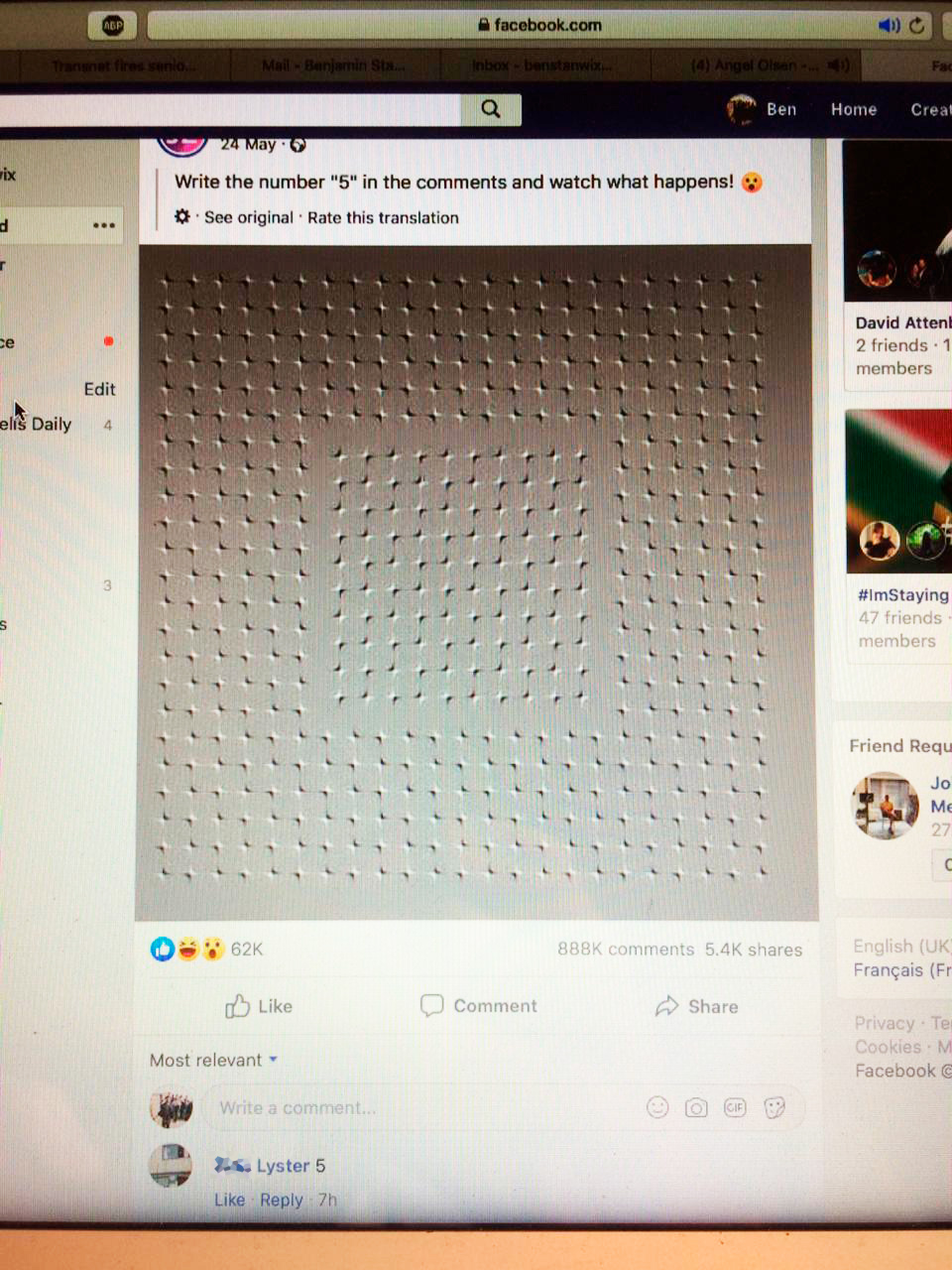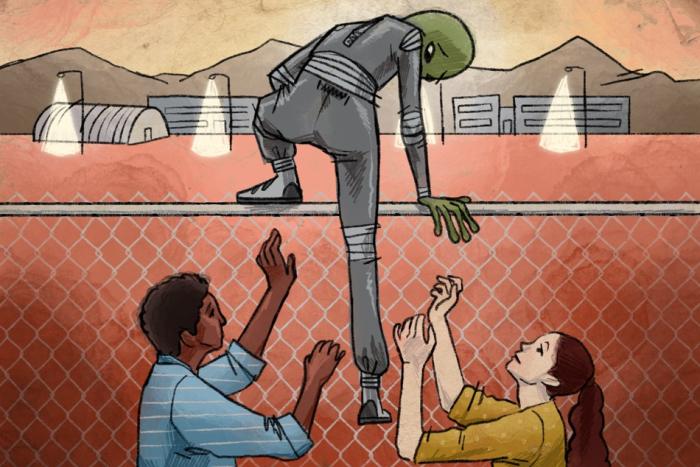What were we obsessed with, invested in and plagued by in 2019? Hazlitt’s writers reflect on the issues, big and small.
Saved on my phone is a photo that is one of my most treasured possessions. Whenever I need to laugh, or to take a load off and just reflect on what kind of a place this life is, and there is nothing in my immediate physical vicinity presenting itself for inspection, I take out my phone and there it is: the best and most hilarious thing.
The photo is of a laptop screen showing my friend Ben’s Facebook feed. Taking up most of the frame is a faintly shimmering grey block with some wiggly lines going around in the middle. It has a certain Magic Eye quality to it, the grey block, but more dreary. At the top of the grey block it says “Write the number ‘5’ in the comments and watch what happens!” You are maybe nodding in recognition by this point. It’s possible you have seen this rubbish grey block and the instruction at the top and thought: No thanks. I don’t need to see what happens when I press “5.” It’s not important to me. I can feel in my spirit that I don’t need or want to press “5” and watch what happens. I’m finished with this idea. If you are even more wise to the ways of the world, what you thought was, I am not the type of mark who will press “5,” because what will happen when I do that is nothing.
Even if you have never seen this shitty grey block, you are at least nodding in assent at either of these responses. Who would want to press “5”? Eight hundred eighty-eight thousand people is who. What the screenshot plainly shows is that 888,000 people saw that shitty grey block and thought, Now hang on just one moment. What’s this “write ‘5’” business—intriguing. I’m not too proud to admit, even just here quietly to myself, that I’d like to see what happens with this unpromising-looking grey block when I write “5.” The world is full of wonders, even now, and I am not the kind of cynic who turns coldly away from the opportunity to write “5” and watch what happens.
 Eight hundred eighty-eight thousand people did that, according to the screenshot. I only know who one of those people is, though: my mum. You can see her there, under the grey block, writing “5.” Waiting. Watching. “5.” It’s obviously just the way the algorithm works, showing Facebook users only the commenters that they’re friends with, etc., but the way it appears on Ben’s feed makes it look like my mother is the only person in the world who has done it. Just my mum sitting there in her office, on the computer, maybe with the ceiling fan whirring away, no one around, thinking, What harm can it do. It seems like what they’re saying is the picture is going to swirl around a bit, and maybe that would be nice for me. Well, here goes: 5. Let’s see, now.
Eight hundred eighty-eight thousand people did that, according to the screenshot. I only know who one of those people is, though: my mum. You can see her there, under the grey block, writing “5.” Waiting. Watching. “5.” It’s obviously just the way the algorithm works, showing Facebook users only the commenters that they’re friends with, etc., but the way it appears on Ben’s feed makes it look like my mother is the only person in the world who has done it. Just my mum sitting there in her office, on the computer, maybe with the ceiling fan whirring away, no one around, thinking, What harm can it do. It seems like what they’re saying is the picture is going to swirl around a bit, and maybe that would be nice for me. Well, here goes: 5. Let’s see, now.
Ben caught this perfect moment during one of his bi-monthly Facebook trawls and sent it to me immediately, knowing that I would fall to pieces with mirth. There is something so pure about it, so lovable. “5.” I sent the screenshot to my brother, whose reaction was identical to mine: great shouts of laughter and then a great wave of love for our mum, as he imagined her sitting at the computer with her finger hovering over the 5 key. Pressing it. Nothing happening. Looking. Staring. Pressing it again. “5.” Nothing.
I sent the photo to all my friends who know and therefore love my mum, and they fell to pieces too, and we all had a great morning discussing “5,” the very idea of it, and the idea of our parents on Facebook, thinking no one can see what they get up to on there. “5.” All of our parents, in their different ways, all sitting at the computer and pressing “5.” Replying to a message in their inbox by writing on their own Facebook wall, and then underneath that saying, “Sorry, I thought I was replying to Irene.” Writing “Happy Birthday Chris. !!” with the weird spacing that the dads love to do now on, again, their own wall and then phoning their daughter and asking how do they send it to Chris, this birthday message. How does Chris get it. Being vulnerable to clickbait in a way that is more touching, somehow, than our generation’s same apparently infinite capacity to be gulled into clicking on stupid bullshit. Getting harvested for their likes right there in the open. “5.”
I knew I shouldn’t send the photo to my mum, because she would of course be mortified by the information that she had gone viral among my friends simply for the act of typing “5,” simply for having an open and curious mind and the generosity of spirit that allows you to believe that pressing “5” will yield gratifying results. At some point, however, I could take it no longer, and sent her the photo, needing to know what had made her do it, how did she feel when nothing happened, and so on. She talked me through it, the process of pressing “5”: “I typed ‘5’ even though I thought: this is stupid—I shouldn’t be doing this. Then I stared at the shimmering image expecting a five to miraculously appear (I think). Then when nothing happened, I thought I must have done it wrong and tried again. Stared long and hard again. Nothing.”
She handled the ensuing barrage of questions very well, I thought. How would you type the number 5 “wrong”? How long did it take you to realise that nothing was going to happen? Did you stand up so you could get a better look from farther away? Do you know that this is insanely, indelibly funny? Etc.
She is one of those people who is properly able to laugh at herself, and to handle being teased, and so she was less embarrassed than I’d worried she would be. She was more suspicious, though. It was all new to her, the knowledge that Ben or anyone else could see her typing “5,” and she took it hard.
“I knew I was being had,” she said, “even as I typed it. I knew it was a trick.” I asked her what she meant by a “trick,” and she said that she believed that she had been the “victim” of “a scam to make people laugh at you.” “You type ‘5,’ and it shows up on everyone’s feed, and then everyone knows that you are the kind of idiot who presses ‘5.’”
It was at this point that my understanding of the meaning of “5” began to expand and contract, and I started to feel the powerful metaphor in it, the unassailable mystery, the way it said something, surely, about the internet and our relationship to it here in 2019. About The Way We Live Now, even. “5.” Impossible not to imagine an anthropologist of religion writing about it in 1000 years’ time, in a version of the future that allows for the continuing existence of such things as anthropology departments. An academic whose area of focus is highly ritualistic cults, striving to make some kind of logic out of it, or situate it within an already existing theory of religious behaviour. Probing vainly, trying and failing to devise a methodologically sound explanation for what it was that compelled all these people to write 5 and watch what happens, one after the other, 5 after 5. Pressing “5.” Sitting. Looking. Nothing happening. “5.” Nothing.
As I explained to my mum that she was not the victim of “a scam to make people laugh at you” (which, as an aside, is easily, easily the best definition of clickbait I have ever heard), but a “victim” of this thing called “like farming,” whereby someone “harvests likes” in order to “up their profile,” I realised that this explanation was no more satisfactory than the one she had come up with. I debated briefly whether to send her a very sassy article I had found about the whole “5” business, where the writer repeatedly describes it as a scam and says stuff like, “By creating one of these silly posts, sad and desperate little Facebook users can trick a lot of people into liking, sharing, and commenting on their material, thereby promoting their Facebook Page or Profile across the network.” I decided against it, and not only because my mum doesn’t need that kind of negative energy in her life. This wasn’t a scam scam, it didn’t seem like. After you press “5,” the only thing that happens is nothing. You are not being ripped off, not really. All that is being taken from you is the extremely dubious pleasure of seeing swirly lines on a grey block move around and maybe the number 5 appearing. That’s not what a scam is. She asked me what the point of it was, “other than to make fools of us,” and I said more about algorithms and “harvests” and then I kind of trailed off, because while she was wrong in the specifics, she was headed in the right kind of direction, and any explanation I could give her did not in any way account for the true mystery of “5,” and why she pressed it, why anyone did, and what actually is going on.
There is no sense to be made of it, no logic to be derived, no sophisticated or intelligent interpretation. “A scam to make people laugh at you” is no more or less bizarre than a description of “like-farming” that I found, which says, “The ultimate dream of every like-farmer is for his post to go viral by accumulating as many likes and shares as possible from all over the world.” That sentence has the aura of a curse, like if you read it too many times or even think about it for too long you will die or go blind or start to hear horses speaking to you in English. There’s just something fundamentally unsound about it, something scary and weird and emblematic of these scary and weird times. “The ultimate dream of every like-farmer.” “5.”
In many ways, this has been the year of “5,” a year when the standard explanations for why a thing happens turn out to be equally as useless as the most far-out conspiracy theories, when it comes to making sense of what has transpired. The Epstein saga had a powerful energy of “5” about it, for example. The straightforward or official explanation is stupid and inadequate and doesn’t actually hold water, not really. The explanations put forward by people with a suspicious cast of mind are risible at first, and then less so the more you think about it.
There’s been an air of “5” around for a while now, this feeling that there is no good way to arrive at a nuanced and robust analysis of what is happening, whatever the fuck that thing might be. Even the most boring explanations are taking on a slightly otherworldly tinge. Why is Boris Johnson lying to reporters about doing maths at night? “Because he thinks the punters will love it” seems like a straightforward answer, but is it really, and is that what’s actually going on, and why does he have to be so unsettlingly peculiar on top of being so transparently evil? Can we find a way to answer these questions? We cannot. “5.” Why did Elon Musk call a cave diver a “pedo guy” and then lie about it, over and over, and then hire a private investigator with an almost over-the-top air of fraudulence about him and task him with the mission of “proving” his ridiculous, baseless allegations. “Because Elon Musk is a malicious person with incredibly bad impulse control, as well as being not too sharp” is the answer that immediately springs to mind, but is there not more to it than that? What kind of life is it that someone can just behave in that fashion? You don’t know. “5.” Prince Andrew off-roading in a BBC interview, talking gibberish about not being able to sweat after the Falklands War? “Idiot, ultimate upwards-failing weirdo, no one brave enough to let him in on the truth about how vastly he has overestimated his ability to charm his way out of a jam,” sounds okay, but then you mull it over and it’s just not good enough. You need more information, and you are not getting it, and you cannot be sure of whether that information even exists. “5.” Why is Donald Trump talking about “other elements of bathrooms” like that now, what does it mean, what is the purpose, who is in charge, what is all this in aid of. You don’t know. “5.”
The sense of “5” hangs in the air like smoke, these days, and you are finding yourself on increasingly shaky ground when you try to come up with a good and coherent interpretation of the situation. Each explanation is as bad as the next, and you’ve got nothing. You are just sitting there, thinking about “5,” wondering if maybe something would happen if you pressed it a few more times, maybe. “5.”






